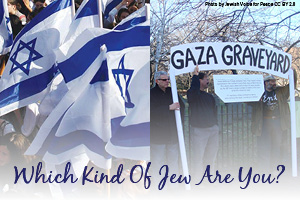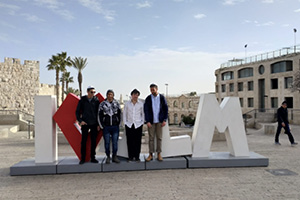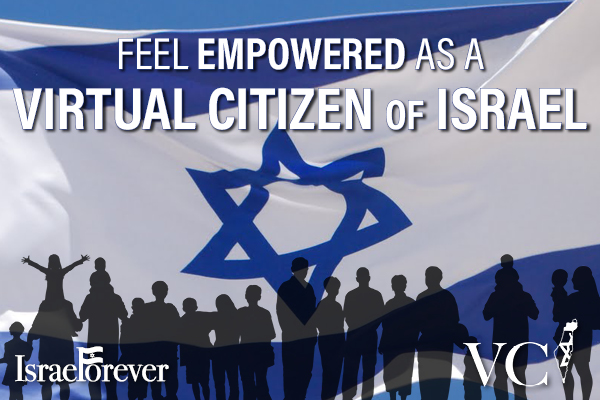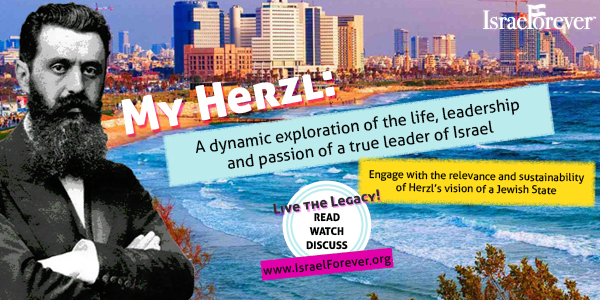If You Are It, Then Be It
by Eitan P.
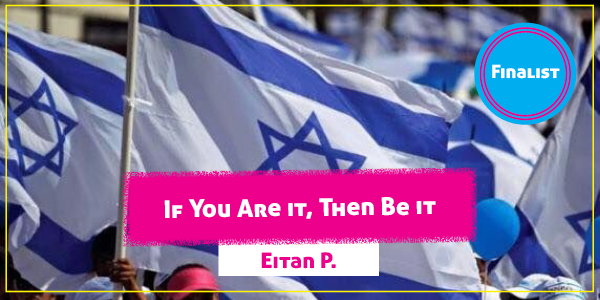
From my years at a Jewish elementary school and Jewish overnight camp I had heard about Theodor Herzl but knew little about him, so when I learned about this contest I decided to actually read The Jewish State. I was immediately shocked by two things. First, how timely it still is. The Europe of the 1890s he describes seems frighteningly similar to 2020 America, and the “Jewish Question,” as he called it, seems as alive as ever. And second, its insights into my own life as a Jew living in America, into my own Jewish “journey” of identity and identification, made it personal. And so I had to write.
1. THE JEWISH QUESTION
For Herzl, the “Jewish Question” was, “Can Jews live as Jews in Europe?” Could Jews practice Judaism while also having equal rights and physical safety? Could Jews identify as Jews and still fit in with the majority of non-Jews around them? There had been an entire century of “emancipation,” which meant that officially Jews were equal citizens to everyone else. For some Jews, this was an opportunity to assimilate into European society, intermarry, be successful, live well. But assimilation, Herzl thought, could not succeed in the end.
It wouldn’t work because what makes assimilation possible, he wrote, is the social and economic success of Jews in European society, but then that very same success creates an antisemitic backlash which prevents assimilation. Indeed, he saw firsthand the 19th-century rise of antisemitism throughout Europe. When he heard the spectators shouting “Death to the Jews!” during the Dreyfuss Affair he knew that the answer to the “Jewish Question” was, simply, no. Jews could not live as Jews in Europe. A few decades later the Holocaust tragically proved him right.
The only solution to the Jewish Question, he felt, was for Jews to leave Europe— and with this, Zionism, and ultimately the State of Israel, were born.
But while Herzl was right about the fate of Jews in Europe, he got something very wrong too. He believed the establishment of Israel would end antisemitism. It hasn’t, not in Europe and not even in America. And he never dreamed that Israel itself would simply become the target of antisemitism.
America, especially, was supposed to be different. It was supposed to be the “Golden Land,” like Europe, only after successful emancipation. Within a couple of generations Jews here became really free, really equal, and successful in many fields.
But recent years have seen an explosion of antisemitism here. Right-wing White Supremacists rally against the Jews. African-American leaders like Louis Farrakhan spew hatred against Jews. Extreme left-wing activists spout similar hatred against Israel on college campuses.
And there has been so much serious violence just in the past year: shootings in Pittsburgh, San Diego, New Jersey, a mass stabbing with a machete at a Chanukah party in Monsey, daily attacks on Orthodox Jews in Brooklyn. I’ve read stories where students call for the death of Israel on campuses. Can the Dreyfus mobs, shouting “Death to the Jews!”, be far behind? My father showed me the picture of Herzl on the balcony over the river before the First Zionist Congress. I imagine him standing on a balcony overlooking any of these scenes in America, and wonder what he would think.
So the Jewish Question is alive and well, in a new form: Can Jews live as Jews in 2020 America? As a fourteen-year-old entering high school, and soon college, reading Herzl has terrified me.
2. MY QUESTION
For most of my life I have lived in a comfortable space, straddling my Jewish and non-Jewish worlds. I went to a Jewish school and celebrated my holidays, but also participated in many non-Jewish activities (such as sports). I wasn’t different because I was Jewish, I was different in ways that every individual is different. My modern Hebrew name was just another “unusual name” like so many others’. I felt safe and accepted in both these worlds.
But things began to change when I entered a non-Jewish middle school. Leaving the protective Jewish bubble of elementary school I suddenly became aware of what being a minority really meant. And I had to start figuring out who I was, who I wanted to be, was even comfortable with being, standing out from everyone around me. Was being a Jew in this environment even possible, for me? I faced hard decisions about wearing a kippah, going to school events or socializing on Friday nights. Correcting people’s pronunciation of my Hebrew name took on a new feeling, as it was now identified as Jewish.
In this environment my differences even with my Jewish friends were magnified. I became aware that my definition of being Jewish didn’t line up with those of some of my peers, and I was clashing with friends who had Jewish ancestry but no real Jewish identity. I became suddenly aware of how sheltered I had been in my Jewish environment, where I never had pushback talking about Israel or antisemitism, where I didn’t have to explain why a conversation about the Holocaust was personal.
These questions have gripped me throughout the past year. In January 2019 I had my Bar Mitzvah. In March I performed a spoken word poem about Jewish identity called “What Kind of Jew Are You?” I spent two summer months at a Jewish sleep-away camp, and in September I started wearing a kippah publicly. As these things happened, I started to notice that people changed how they looked at me, even how they treated me. There was no question that some people were uncomfortable with my spoken word poem, and with my kippah, with my “coming out” as a Jew. This included my Jewish friends too, if not even more so. I had hit a nerve.
There were people who had never particularly identified as Jewish before who suddenly started speaking “as a Jew” to argue with me over what it meant to be Jewish—for me. One thing I found most interesting was how people lost patience for the topic of antisemitism. They would try to change the topic or broaden it to a conversation about all minorities and prejudice. I experienced more pushback on what counted as antisemitism, and whether or not I was being “over-sensitive” when the issue came up. People rolled their eyes at me, seemed upset with me, I felt, simply because I was openly—and unapologetically—identifying as a Jew. And these were my friends.
Reading Herzl as I thought about this contest, it suddenly hit me that when I was asking, “What kind of Jew are you?” in my spoken word poem, I was really asking what kind of Jew did I want to be. I was asking this question as a Jew living in an America that is largely non-Jewish, in an environment that seems to be becoming more and more “upset” with Jews and the Jewish state.
Herzl’s question, the “Jewish Question,” I realize now, is my question. Only now it seems even harder. Herzl’s answer, the Jewish state, already exists, but antisemitism is alive and well and often aims at Israel.
3. IF YOU ARE IT, THEN BE IT
I don’t know how to stop antisemitism. A lot of smart people have been trying to do that for a long time. As I was writing this essay there was a huge rally in New York against antisemitism. I thought it was exciting and important but will it suddenly make people stop hating Jews and Israel? I don’t know how to stop antisemitism but I still have to figure out how I should live as a Jew in 2020 America.
Is Herzl’s answer for Europe, the answer for America today? Namely, leave? Perhaps, in an ideal world, we American Jews would all move to Israel—our protective bubble. I can definitely understand why certain individuals make aliyah, Israel is like no other place for Jews. It is the only place in the world where Jews can fully live as Jews. I visited when I was very small, and half my family is there—I already imagine that I might make aliyah someday. This response is a good response for many people.
But is this a realistic goal for everyone? Israel is a foreign country to most American Jews, and it isn’t so simple just to move and leave family, friends, and jobs behind, and start over. And for many American Jews, their American identity is too strong to give up. Convincing a large number of American Jews to make aliyah is just not likely to happen.
But I also think there are deeper reasons this answer is not a good answer for here. If we care about preserving Jewish identity and care about Israel, then we need Jews in America to help keep America as an ally and supporter of Israel. If we all leave, then the antisemites can take over easily. Additionally, to have all the Jews in the world move into one tiny country the size of New Jersey is a real safety issue. One nuclear bomb would wipe us all out. This may sound dramatic but after the Holocaust we have to think this way. Even now, as I write this essay the news is filled with Iran threatening to attack Israel.
Finally, this answer is really a “defeat.” It suggests Americans and Jews can’t mix, so we run away. This strikes me as giving up on the dream of America, which is really a good dream. Historically, minorities that overcame discrimination always did it by equalizing themselves in the eyes of the majority, and the Jews should aim for the same. Not give up, but instead increase our pride in our Jewish identity.
It’s not only where you live, it’s how you live as a Jew. One way to increase pride might be to become more religious. Judaism is a beautiful religion, a way of life, and is definitely an important source of identity and pride. There was just a big “siyum” in New Jersey celebrating the end of the Talmud cycle that brought 90,000 Orthodox Jews together.
While my family belongs to an Orthodox shul our level of observance is not itself Orthodox; but still, looking at pictures of that event I could really feel the identity and the pride, so much that I even subscribed to a Daf Yomi newsletter. I am not sure if I would ever become fully Orthodox myself, but I so appreciate the many people who are. I am still trying to become comfortable wearing my kippah in public, but I am in awe of those who are open and proud Jews who are not afraid to “look like” Jews.
But just like there are huge obstacles to Jewish Americans all moving to Israel, so too it is unrealistic that a large number of American Jews will become Orthodox, or even just “more religious.” People can’t just change their belief systems, and ways of life, so easily. I recently heard a podcast about how, generation by generation, Americans are getting less religious, Jews and non-Jews.
For most of the kids I know, religion seems old-fashioned and even silly. Of course most American Jews belong to the other denominations of Judaism, and they can find identity and pride there too. I am still learning about religion but many people I know from those denominations seem to identify more as Americans than as Jews. And according to this podcast they are becoming less and less religious too. So religion can’t quite be the answer.
So is there a way to live as a Jew, and as an American, in the right balance? Clearly, this means standing up for and being proud of one’s Jewishness, but what exactly does that mean? If we can’t all make aliyah and we can’t all become more Orthodox, what is the answer? As I mentioned, there was just a big rally in New York against antisemitism. Obviously that is good, and it was good that a few days before, an editorial in the New York Times urged people to participate in it. But then the Times chose to highlight as its top comment on the editorial, as a “Times Pick,” the following comment:
Stamping out antisemitism is definitely a good idea. Attempting to stamp out criticism of Israel is definitely a bad idea, and could well lead to more antisemitism. Be VERY VERY CAREFUL not to allow any part of this march to be seen as a pro-Israel demonstration. Israeli flags or blue and white banners will do much more harm than good.
As I thought about why this comment bothered me I realized what the answer to my question, my Jewish Question, should be.
Be careful NOT to support the Jewish State, as a Jew? This demand implies that Jews shouldn’t support the Jewish State. That Jews who do support it are not welcome in this space. That if you want our support against antisemitism, then you have to be the kind of Jew we want you to be.
But to tell Jews protesting antisemitism that support for Israel may increase antisemitism is to tell Jews they should shut up and become invisible because otherwise people will hate them more. To tell Jewish people protesting antisemitism that they should not show support for Israel is to tell Jewish people to have no pride in themselves or their identity. But that is the very opposite of standing up and being proud of one’s identity.
And so being a Jew, a proud Jew, should mean showing your support of Israel. And if the dream of America is to be a place where people are proud of their identities, then being a proud American Jew should mean being proud of supporting Israel. This means connecting to Israel, learning about and visiting Israel, meeting Israelis, but most of all, not being scared to talk about Israel.
The beginning of the answer, in other words, is not to hide. The beginning of the answer is to defend our identity by wearing it proudly. It is to show those who warn us about “how” to be Jewish if we want to be accepted that we decide how to be Jewish. I don’t know how to stop antisemitism but I do know that the start is to proudly, unapologetically, bravely, live as an “out” Jew in America—and that that includes standing up for Israel.
If you are it, Herzl might remind us today, then be it.


